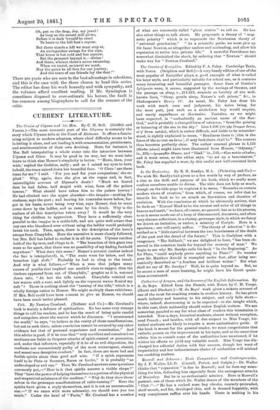Pith. By Newton Crosland. (Triibner and Co.)—Mr. Crosland's book is
mainly a defence of spiritualism. He has some very strange things to tell his readers, and he has the merit of being quite candid and outspoken about the matter which he discusses. "I recommend the world," he says, "to believe in the verity of these manifestations, but not to seek them, unless conviction cannot be secured by any other evidence but that of personal experience and examination." And this advice is good, if it be true that" very excellent and conscientious mediums are liable to frequent attacks of spirit-control or possession, and, under that influence, especially if it be of an evil disposition, the mediums are unconsciously guilty of the most extravagant, absurd, and sometimes deceptive ccnduct." In fact, there are more bad and foolish spirits about than good and wise. "If a spirit represents itself to be Plato or Socrates, Bacon or Locke," it is probably "an sindeveloped or evil one." Then Mr. Crosland answers some questions commonly put,—" How is it that spirits assume a visible shape ?" They "have the power of helping themselves to a portion of the physical and magnetical substance of the medium." "Why do they show them- selves in the grotesque manifestations of table-turning ?" Here the spirits have given a reply themselves, and it is not an unreasonable one,—" If we came with more solemnity, we should awe you too much." Under the head of "Facts," Mr. Crosland has a number of what are commonly called "ghost stories" to tell us. He has also other things to talk about. He propounds a theory of "mag- netic polarity" which is to supersede the Newtonian theory of "universal gravitation." "As a scientific guide, we must give up Sir Isaac Newton, as altogether useless and misleading, and allow his reputation to retire into private life." A merciful Providence has somewhat diminished the shock, by ordering that " Newton " should make way for "Newton Crosland."






























 Previous page
Previous page